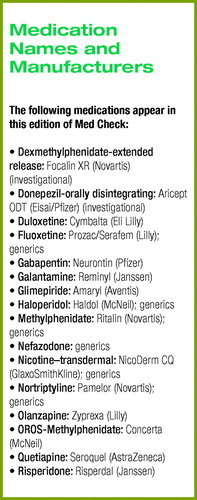Med Check
Regulatory and Legal Briefs

Research Briefs
Nortriptyline added to transdermal nicotine therapy may significantly boost a patient's chance of quitting smoking. In a randomized controlled trial of 158 patients, those taking nortriptyline along with the nicotine patch had higher cessation rates at six months (23 percent), compared with those on placebo and the nicotine patch (10 percent). While cessation rates increased with nortriptyline, nicotine withdrawal symptoms were not significantly different between the two groups. Nortriptyline therapy was associated with significant, frequent adverse effects including dry mouth (38 percent of patients) and sedation (20 percent). Arch Intern Med 2004; 164:2229-2233 | |||||
Risperidone may be effective in reducing core deficits associated with pervasive developmental disorders and autism. In a double-blind, randomized trial involving 79 children, aged 5 to 12, risperidone was associated with significantly greater reductions in irritability compared with placebo (64 percent reduction versus 31 percent) and was also associated with improvements in conduct, insecure/anxious behaviors, hyperactivity, and social sensitivity. Global improvement occurred in 87 percent of children taking risperidone compared with 40 percent taking placebo. The most frequent adverse effects noted in patients taking risperidone were somnolence, weight gain, and increases in pulse rate and blood pressure. Pediatrics 2004; 114:e634-e641 | |||||
Duloxetine is an option for the treatment and management of major depressive disorder, according to a review of published as well as unpublished clinical trials and poster abstracts presented at professional meetings. The serotonin-norepinephrine reuptake inhibitor is effective in depression at daily doses between 40 mg and 60 mg and has been studied extensively in stress urinary incontinence and diabetic neuropathic pain as well. Clinical trials investigating the use of duloxetine in the treatment of anxiety and fibromylagia are under way. Seven clinical trials have been published on duloxetine use for major depression, involving 3,500 adult patients, over eight weeks to one year of treatment. All seven trials have been positive with respect to efficacy. The most frequent adverse effects associated with duloxetine therapy in clinical trials for any indication have included headache (20 percent to 26 percent), rhinitis (16 percent to 19 percent), asthenia (14 percent to 17 percent), anorexia (12 percent to 13 percent), nausea (13 percent to 46 percent), constipation (11 percent to 14 percent), insomnia (11 percent to 20 percent), diarrhea (9 percent to 19 percent), and somnolence (8 percent to 21 percent). Ann Pharmacother 2004; 38:2078-2085; published online ahead of print November 2, 2004, at<www.theannals.com> | |||||
Fluoxetine significantly delays relapse of major depressive disorder in children and adolescents. A 32-week, relapse-prevention study was completed as a continuation phase of a randomized, double-blind, 51-week study. Twenty patients who were randomized to fluoxetine continued on fluoxetine for the additional 32 weeks, while 20 patients who were randomized to fluoxetine for 51 weeks were switched to placebo for the additional 32 weeks. The average time to relapse was significantly longer in patients remaining on fluoxetine. Relapse occurred in 34 percent of those continuing fluoxetine therapy compared with 60 percent of those switched to placebo. J Am Acad Child Adol Psychiatry 2004; 43(11):1397-1405 | |||||
Industry Briefs
Dexmethylphenidate–extended release is a safe and effective alternative for treatment of both children and adults with attention-deficit/hyperactivity disorder. In three company-sponsored research presentations at the annual meeting of the American Academy of Child and Adolescent Psychiatry in Washington, D.C., in October, results showed suppression of core symptoms was significantly greater with dexmethylphenidate–extended release compared with placebo in a six-month clinical trial involving 221 adults randomized to daily doses of 20 mg, 30 mg, or 40 mg. Similar results were seen in two pediatric trials, one of which compared the drug with placebo in 103 patients aged 6 to 17, and the second of which evaluated a daily dosing regimen of 20 mg in 54 children aged 6 to 12 who had previously been stabilized on 20 mg to 40 mg of methylphenidate a day. Both pediatric studies showed positive results. Adverse events were similar in pediatric and adult patients and were consistent with those known to be associated with methylphenidate, including headache, insomnia, and decreased appetite. | |||||
ACP-103, Acadia Pharmaceuticals' novel 5-HT2A inverse agonist, may significantly reduce motor disturbances and hyperprolactinemia associated with antipsychotic therapy. A double-blind, phase II clinical trial involving 18 healthy volunteers showed the investigational drug blocked akathisia associated with haloperidol administration and reduced the hyperprolactinemia associated with the typical antipsychotic by 35 percent. Acadia is developing the drug as a novel therapy to be used in combination with atypical antipsychotics as well, and trials are planned with olanzapine, risperidone, and quetiapine. ▪ | |||||



